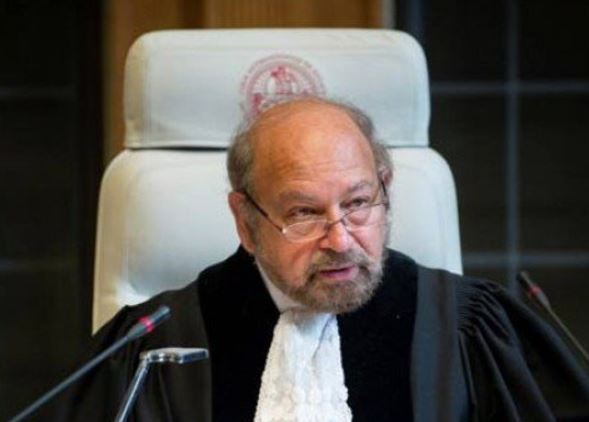Web Report
Dubai: The UN’s top court on Thursday announced its ruling on an urgent bid by India to stop Pakistan from executing a death sentence for Kulbushan Jadhav, one of its nationals convicted of spying and subversive activities in Pakistan.
Rejecting Pakistan’s argument that the court did not have jurisdiction in the matter, the International Court of Justic (ICJ) reasoned it could hear the case because it involved, on the face of it, an alleged violation of one of the clauses of the Vienna Convention, which both Pakistan and India ascribe to and whose interpretation falls under its purview.
“Pakistan should take all measures to ensure that Jadhav is not executed till the final decision of this court,” the court said.
The court also said Pakistan should inform it of all measures taken in implementation of the order. The president of the court, Ronny Abraham, read out the decision.
After the order was announced, Attorney General Ashtar Ausaf reasoned that the ICJ had directed for “the status quo be maintained in the case” — ie, that Jadhav’s status remain as it stands right now, with the execution of his sentence delayed till the court deliberates the case.
“The court has clearly underscored that the provisional measures are without prejudice to the final determination of the merits and jurisdiction of the case,” he pointed out in a written statement. “The provisional measures are a procedural process only to enable the court to have full consideration at a later hearing,” he said.
“These measures have no bearing whatsoever on the final decision of the Court,” he added, meaning that this was only a temporary relief granted by the court.
He also responded to critics who said Pakistan should not have accepted the ICJ’s jurisdiction, saying: “Pakistan attended the hearing out of its utmost respect for the court and pursuant to the established jurisprudence that the challenge to jurisdiction can be made via appearance and not by abstaining from the process.
“In addition, Pakistan attended because of its conviction that the only way to resolve all outstanding issues is through peaceful means. We are confident that India would not be able to hide the subversive activities it is trying to carry out through its agents like Commander Jadhav,” he added.
In a press release posted to the ICJ’s website, the court provided its reasoning for the order it had issued.
“The Court begins by considering whether it has jurisdiction prima facie to hear the case. It recalls that India seeks to ground its jurisdiction in Article I of the Optional Protocol to the Vienna Convention, which provides that the Court has jurisdiction over,“ disputes arising out of the interpretation or application of the [Vienna] Convention”.
“In this regard, the Court notes that the Parties do indeed appear to have differed, and still differ today, on the question of India’s consular assistance to Jadhav under the Vienna Convention.
“It further notes that the acts alleged by India […] appear to be capable of falling within the scope of the Convention. In the view of the Court, this is sufficient to establish that it has prima facie jurisdiction under Article I of the Optional Protocol.
“The Court further observes that the existence of a 2008 bilateral Agreement between the Parties on consular relations does not change its conclusion on jurisdiction.
“The Court then turns to the question whether the rights alleged by India are at least plausible. It observes that the rights to consular notification and access between a State and its nationals, as well as the obligations of the detaining State to inform the person concerned without delay of his rights with regard to consular assistance and to allow their exercise, are recognized in Article 36, paragraph 1, of the Vienna Convention, and that India has alleged violations of this provision.








































